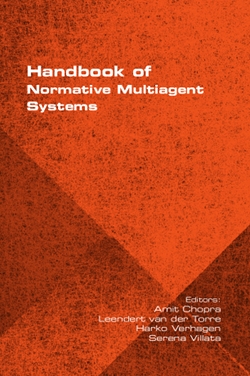 | Handbook of Normative Multiagent Systems
Amit Chopra, Leendert van der Torre, Harko Verhagen and Serena Villata, eds
The Handbook of Normative Multiagent Systems presents a comprehensive overview of the state-of-the-art and trends in the research field of normative multiagent systems (NorMAS). The handbook provides a solid introduction to the essentials of the field for newcomers and a selection of advanced issues as a base for future research directions.
Norms are widely used to represent ethical, legal, and interactive aspects of social systems. Normative multiagent systems provide a promising model for human and artificial agent coordination since they integrate norms and individual intelligence. Thus, in the NorMAS community we build upon computer science but also logic, legal theory, sociology, psychology, and cognitive science.
The handbook is organised in four parts. The introduction part describes the foundations and the history of the field and adds a particular focus on the social sciences’ view on norms.
The second part describes the major achievements the NorMAS research fi eld attained in the modelling of normative multiagent systems and the main challenges still open. Examples of these challenges include how to specify norms, verify systems of norms, model norm emergence and norm change, detect and subsequently manage norm violations, model organisations and institutions, and the use of agent-based simulation models to study these norm-related processes.
Part C is concerned with the engineering of normative multiagent systems, more in particular interaction protocols to convey normative meaning and how to computationally organise normative multiagent systems.
The final part is concerned with logically analyzing normative multiagent systems. Given the profound importance of norms in multiagent systems, it is fundamental to understand, e.g., which norms are valid in certain environments, how to interpret them, and to determine the deontic conclusions of such norms.
6 August 2018
978-1-84890-285-9
Buy from Amazon: UK US
For Digital Download:Download
|

